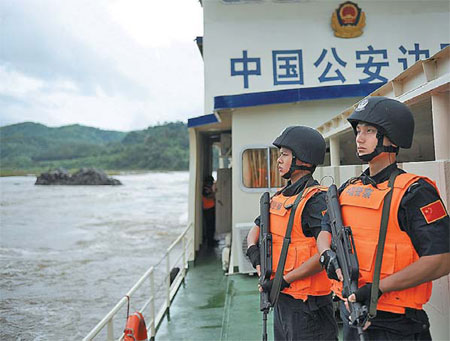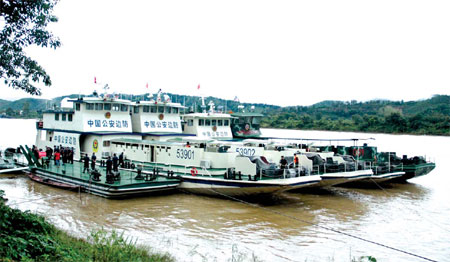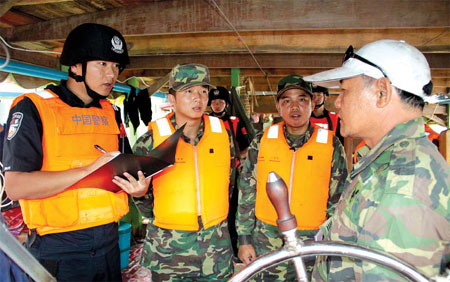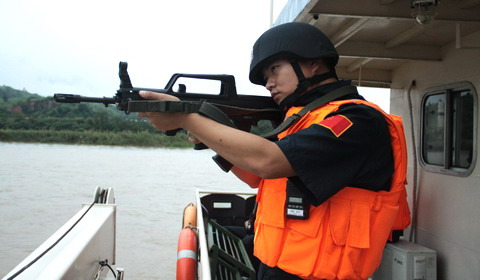Patrols bring security to Mekong River
Updated: 2013-12-17 07:14
By Hu Yongqi (China Daily USA)
|
|||||||||
Shipping in the region is safer than ever thanks to joint efforts between China and its three neighbors, reports Hu Yongqi in the Golden Triangle
Sirens blared a warning across the apparently tranquil Mekong River as a Chinese patrol fleet entered the waters of the Golden Triangle, Asia's second-largest opium-producing region.
Chinese border police loaded their guns in the cabin before jumping through a hatch onto the deck in response to the Level 1 alert. The area is notoriously dangerous and was formerly the hunting ground of a gang led by Naw Kham, a Myanmar drug lord who was executed in March in Kunming, the capital of Yunnan province.
The Chinese officers, who are stationed in Xishuangbanna Dai autonomous prefecture in Yunnan, were ordered to take cover behind bullet and shellproof panels.
Ji Guojun, a 26-year-old officer, took up position on a platform at the stern of the ship. Another officer in full body armor stood on the bow and surveyed the surroundings through binoculars. Near at hand, he kept a machine gun whose 6-cm-long cartridges have a range of 2 kilometers. However, there was nothing to see and the only sounds came from the water rushing by under the ship.
The officers heaved a collective sigh of relief, but it was the tensest moment of the 16th joint river patrol by forces from China, Laos, Thailand and Myanmar. Yunnan Border Police Corps, a subdivision of the Ministry of Public Security, sent three ships and more than 100 armed officers to assess safety on the river.
The patrol followed its usual route on the 512-km round trip, which started at Guanlei in Xishuangbanna on Nov 19 and ended at the port of Chiang Saen in Thailand four days later.
The Mekong flows through six countries, including China, Myanmar, Laos and Thailand, and is a vital channel for cargo shipping.
However, international shipping was temporarily suspended in the Golden Triangle in October 2011, after 13 Chinese fishermen were kidnapped and murdered by Naw Kham's gang. The drug lord was executed in March.
More than one month after the attack, Chinese police initiated the joint patrols to maintain safety on the river. Then the Yunnan Border Police launched a new unit, called the Waters Division, to patrol the river and improve communications with China's three neighbors, said Jin Shangwen, chief of staff of the Yunnan Border Police Corps, who also commanded the 16th Patrol Fleet.
Approximately 90 percent of the route runs along Laos' borders with Myanmar and Thailand. Drug smugglers and dealers have long posed a threat to international shipping on the waterway, especially in the northeastern areas of Myanmar that are under the control of ethnic armies, meaning the acquisition and use of weapons are hard to control, according to the officers.
"Our forces have helped to facilitate the patrols by coordinating the exchange of information, among other things, with our three neighbors. Now shipping on the Mekong is safer than ever and the cargo volume has bounced back to the levels we saw before the attack on the fishermen," said Jin.
Busting the smugglers
The patrol fleet left a foggy Guanlei Port in southern Xishuangbanna early in the morning and arrived at Maung Mo, a Chinese police base on the riverbank in Thon Pherng county in western Laos, 10 hours later.
A 20-minute drive south of Maung Mo lies the Golden Triangle Special Economic Zone, which is controlled by a Chinese man called Zhao Wei. The zone is famous for the sexual and gambling services on offer; once visitors clear security, they can gamble in casinos where a single win can net 80 million Thai baht ($2.5 million) and young bikini-clad women provide "entertainment" for the customers. Even the local supermarket counters offer posters of the women.
While the trade in narcotics has won the Golden Triangle global notoriety, the fight against the drugs smugglers never stops. With the assistance of Xishuangbanna public security bureau, the Waters Division arrested five smugglers in March and impounded 579.7 kilograms of crystal meth with a street value of more than 500 million yuan ($82 million).
Earlier this year, drug dealers tried to attack the patrol with a line of floating bombs. However, they miscalculated the water speed, meaning the bombs sank and failed to explode after becoming lodged in rocks on the riverbed.
"Along the river, the beauty of the trees and flowers present wonderful sights for travelers, but drug smugglers often use these tranquil forests as camouflage and attack our ships from hidden positions. Everyone on board is extremely anxious about the happenings along the riverbank," said Ji.
The Waters Division employs nine experienced captains, each of whom has been navigating the Mekong River for at least 10 years. "The fluctuating water level poses a danger. In the rainy season, the water rises and we have to try to remember the exact locations of submerged rocks," said one of the captains, Li Yuangang, 44.
During the dry season, which runs from January until May or June, the water level in Xishuangbanna and the neighboring areas in Myanmar and Laos falls drastically, making navigation even more perilous, according to Li. "During that season, rocks stick out of the water and ships are often stranded in the narrowed watercourse," he said.
Last year, a Laotian vessel sent out an SOS after it ran aground on a sandbank. Li and his crew attempted to pull it free by using a 1-meter-diameter metal pole driven deep into the earth of the riverbank as a winding post for a steel hawser, but the ship wasn't powerful enough to dislodge the stranded vessel, which was heavily overloaded. Sanlang Wangerjia, head of the Waters Division, ordered the cargo to be transferred to other ships and six hours later the vessel was floating freely again.
Merchant ships, which usually weigh less than 200 metric tons, find it easy to navigate the river, but the 450-ton patrol vessels are difficult to maneuver in shallow water. As a precaution, before the voyage began the captains drew up charts showing the precise locations of sandbanks and prominent underwater rocks.
Around six months ago, the captains came up with the idea of requesting a hydropower plant upstream in Jinghong, the capital of Xishuangbanna, to raise the water level and facilitate navigation, said Li. "It worked really well and the river became much safer," he said.
Cooperation extended
Currently, the joint headquarters at Jinghong is home to 12 police officers from Laos, Myanmar and Thailand. They coordinate the patrol boats' work and take charge of any emergencies in the area. Some of the non-Chinese officers are learning Mandarin so they can act as interpreters and further improve communications.
Police Colonel Charkerit Mongkouri, head of the 11th division of the Thai Marine Police, undertook his sixth tour of the Mekong with Chinese ships in November. He commands 153 men in the Thai provinces of Nangkai and Chiang Rai and is responsible for the security of the north and northeastern parts of Thailand.
More than 60 officers based at three stations patrol the stretch of the Golden Triangle where the river serves as the border for Myanmar, Laos and Thailand. Charkerit said the highly visible patrols had overawed those involved in the drugs trade on the river.
"When the patrol teams supervise security, it's definitely a good thing for people using the transnational river. The place is now much safer and we have seen an increase in the volume of goods entering and leaving Thailand in this area since the end of last year," said Charkerit.
However, because Thai law prohibits foreign police from entering the country's territorial waters, a local marine police vessel met the patrol fleet when it arrived at the port of Chiang Saen. Having made contact and reported their findings, the vessels in the fleet returned home.
Jin Shangwen said the fact that the patrols involve four countries means diplomatic ties are even more important than usual. Every morning during the patrol, Jin convened a teleconference with China's Public Security Ministry to report his position and that of the patrol. Laotian and Thai representatives and their interpreters joined Jin as he spoke with officials in Beijing.
Cementing relations
Sports have become a crucial means of cementing relations between the Chinese officers and their foreign counterparts. In October, a Waters Division soccer team played a game against a team from the Marine Police in Wan Pon, a Myanmar town just across the river from Maung Mo. The final score was 2-1 to the Chinese team.
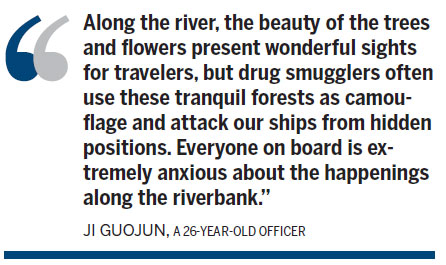
On Nov 20, Aug Zaw Mint, director of the Wan Pon Marine Police, challenged Jin and his men to a tug-of-war contest. More than 300 villagers attended the event, held at the soccer field. Once again, the Chinese were victorious. Women performed traditional dances for the guests and the loudspeakers broadcast popular Chinese songs translated into the local dialect.
In the aftermath of the sporting contests, Aug Zaw Mint and Jin had a long series of discussions about future cooperation.
On Nov 20, Jin met with representatives of the three neighboring countries at Maung Mo to discuss improving the efficiency of joint rescue operations on the river. The meeting reached a consensus that international shipping should be governed by stricter navigation rules, and that the exchange of information between the four parties needs to be improved. Vidone, chief of staff of Bokeo province in Laos, suggested that China should take the lead role in the patrols.
The Yunnan Border Police presented patrol boats to Laos and Myanmar last year and thanks to interaction such as this, the collaboration is going from strength to strength. In 2014, Thailand will deploy two new hydrojets, each costing 2 million yuan, to oversee its stretch of the waterway.
The Chinese patrol fleet checked passing vessels in the company of officers from Laos and Myanmar. Lech, a 29-year-old farmer and shipowner from Thon Pherng in Laos had just paid 3.6 million yuan for a new vessel. He said he wanted to earn extra income by transporting cattle to riverside towns once his crops are harvested every year. He claimed he could make 9,000 yuan per trip.
"These multinational patrols will stop the robbers and drug gangs intercepting our cargo on the river," he said. "Hopefully, that will mean my business will prosper in the years to come."
Contact the writer at huyongqi@chinadaily.com.cn
Li Yingqing and Guo Anfei contributed to this story.
|
Chinese police officers stand guard aboard a patrol boat on the Mekong River in November. Qin Lang / Xinhua |
|
Chinese patrol boats berthed at Maung Mo in Thon Pherng county in western Laos. The patrol followed its usual route on the 512-km round trip that started at Guanlei in Xishuangbanna on Nov 19 and ended at the port of Chiang Saen in Thailand four days later. Photos by Hu Yongqi / China Daily |
|
Chinese and Laotian border police check a Laotian merchant ship. |
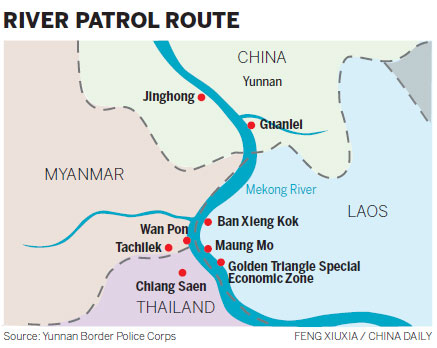
(China Daily USA 12/17/2013 page7)

 US first lady visits children in medical center
US first lady visits children in medical center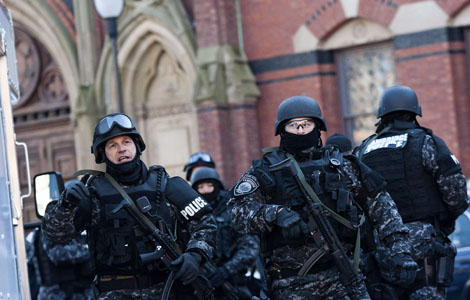
 Harvard reopens after bomb scare
Harvard reopens after bomb scare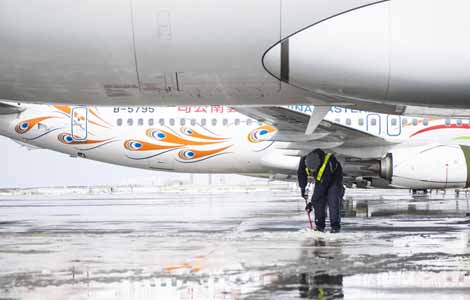
 Snowstorms cause chaos for travelers in Yunnan
Snowstorms cause chaos for travelers in Yunnan
 Kerry offers Hanoi aid in maritime dispute
Kerry offers Hanoi aid in maritime dispute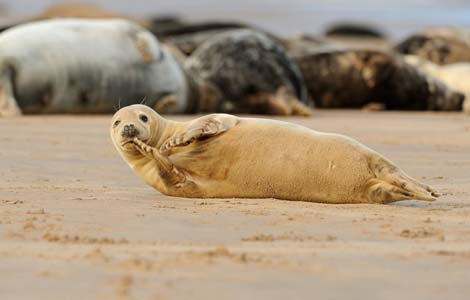
 Cuddly seal enjoys some me time
Cuddly seal enjoys some me time
 Shoppers dropping department stores
Shoppers dropping department stores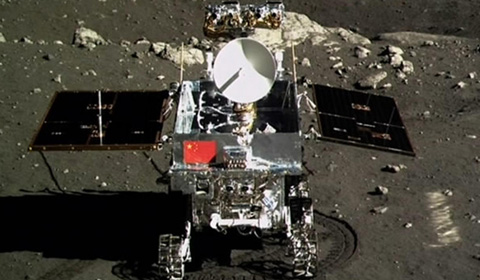
 Moon rover, lander photograph each other
Moon rover, lander photograph each other
 Snow hits SW China's Yunnan province
Snow hits SW China's Yunnan province
Most Viewed
Editor's Picks

|

|

|

|

|

|
Today's Top News
Japan to bolster
military build-up
Continuity in DPRK policies expected
China keen on natural gas
China outlines diplomatic priorities for 2014
China's US debt holdings pass $1.3 trillion
Clashes with US can be avoided: FM
Kerry offers Hanoi aid in dispute
14 terrorists killed in Xinjiang
US Weekly

|

|
